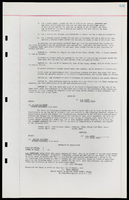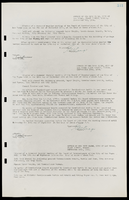Search the Special Collections and Archives Portal
Search Results

Operation Independence Agendas, Planning Boards, Day Care Center Budgets: reports
Date
Archival Collection
Description
From the Clark County Economic Opportunity Board Records -- Series II: Projects. This folder contains agendas, meeting minutes, reports, correspondence, and other documents for Operation Independence and Day Care Center Financial Reports.
Text
Lisa Hank oral history interview
Identifier
Abstract
Oral history interview with Lisa Hank conducted by Barbara Tabach on May 31, 2019 for the Remembering 1 October Oral History Project.
Lisa discusses her move to Las Vegas in the early 1990s from California for a job with the Las Vegas Metropolitan Police Department, and her current position as head of the Police Employee Assistance Program (PEAP). Lisa talks about the night of October 1 and the aftermath of the shooting, both in her work and personal life. She is the wife of Charles Hank III, police officer and another interviewee for the Remembering 1 October Oral History Project.
Subjects discussed include: well-being in aftermath of 1 October; PEAP preparation; healing.
Archival Collection
James Cardle oral history interview
Identifier
Abstract
Oral history interview with James Cardle conducted by Dr. David Emerson on April 25, 2006 for the UNLV @ 50 Oral History Project. In this interview James Cardle speaks about how he came to the University of Nevada, Las Vegas in August of 1985 and began teaching a class on wastewater treatment. He spoke about how he was a member of the curriculum committee, did research on the Yucca Mountain project, and also worked on setting up a master's program.
Archival Collection
Brad Friedmutter oral history interview
Identifier
Abstract
Oral history interview with Brad Friedmutter conducted by David Schwartz on September 12, 2016 for the Building Las Vegas Oral History Project. Friedmutter shares how he develops his architectural projects, his philosophy of design, and the future of urban planning and casino design. He also recalls various owners and designers he has worked with: Henry Conversano, Homer Rissman, Roger Thomas, Donald Trump, Kenny Wynn, and Steve Wynn.
Archival Collection

Transcript of interview with Margaret Price by Joanne Goodwin, March 5, 1997
Date
Archival Collection
Description
When farm-girl-turned-waitress, Margaret "Maggie" Price, came to Las Vegas from Ohio in 1950 with her husband, Francis "Frank" Price, she had no idea what was in store for her in the hot desert oasis. Maggie's career spanned a period of historical transformation in Las Vegas when Downtown was becoming overshadowed by the development on the Las Vegas Strip. Vaudeville and striptease acts were still alive, but the arrival of big-named acts, such as the Rat Pack, Barbara Streisand, and the King himself, Elvis Presley, were just beginning to take the lead. Organized crime was still a prominent part of the culture and brothels still operated somewhat openly. The three decades Maggie and Frank worked in Las Vegas provided them with front-row seats for the birth, transformation, and occasional death of numerous casinos, including the Sahara, the Flamingo, the Sands, the Dunes, the Tropicana, and the International. Initially going to work as a waitress at the El Rancho Vegas, Maggie
Text

Transcript of interview with Darrin Bush by Claytee White, June 30, 2016
Date
Archival Collection
Description
In 1948 in Las Vegas, Nevada, a camera-girl-turned-cocktail-waitress and a casino credit manager welcomed the birth of their son, Darrin Bush. After attaining his education at St. Joseph’s Catholic School and Bishop Gorman High School, Bush earned his Bachelor’s degree in journalism at the University of Nevada, Reno. Bush credits his love for photography to his mother’s influence and his study of journalism. Bush’s first job after college as a room service waiter at the Sahara Hotel eventually grew into the coveted position of room service swing captain. His swing shift duties included the entertainers' dressing rooms, which meant taking care of the entertainers, getting them what they needed, and stocking their favorite foods and drinks nightly. Through his work, Bush eventually formed close friendships with several celebrities of the day. He enjoyed his work, but he never stopped honing his skills as an amateur photographer. In the mid-1980s, Bush left the Strip to become a professional photographer for the Las Vegas News Bureau. Throughout his News Bureau career, Bush photographed the casino buildings made famous by Las Vegas-the construction and the architecture of Southern Nevada’s gaming palaces-as well as iconic events in Las Vegas history. Darrin retired from the News Bureau in about 2014, but his work recording the building of and events of Las Vegas lives on in the News Bureau archives. He continues to be an avid photographer.
Text




